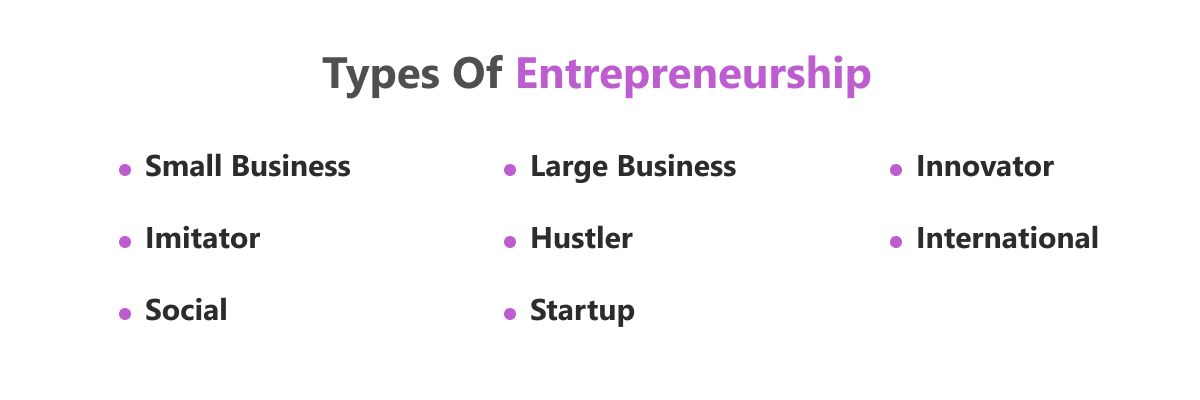People around the world love to do business. Every business starts with an idea, Entrepreneurs transform ideas into successful businesses.
Also, entrepreneurship is not everybody’s cup of tea.
So if you are planning to become an entrepreneur, then it is really essential to understand who an entrepreneur is and what it takes to become one. There are different types of entrepreneurs, and you should be aware of them.
Let’s take a look at different types of entrepreneurs.
Let’s get started.
Who is an Entrepreneur?
The process of setting up a business with an idea and running the business to obtain a profit is known as entrepreneurship.
The person who launches & runs a business is referred to as an entrepreneur.
Entrepreneurs are the people who start the business, administrate the business, and make a profit out of it.
Entrepreneurship bears a lot of risks. If you succeed, you get profit, fame and growth. If you fail, you face financial losses, loss of reputation and self-confidence.
Read Why Startups Fail and How To Make Them Successful.
Types of Entrepreneurs
The ultimate goal of an entrepreneur is to convert his/her invention idea into a successful business. But it’s not as easy as it sounds.
Based on the characteristics of the entrepreneurs, and businesses we have listed out 8 different types of entrepreneurs.
Let’s take a look at them.

1. Small business entrepreneurs
If you are starting a business with low capital to serve the local community or town, then you are a small business entrepreneur. They find a solution for the problem of the local audience, but they don’t establish their business for a larger community outside their location.
Mostly they take loans from their family or friends, or they will invest their savings to start a business. In this, you make a profit only if the business succeeds.
Employees in this business are mostly family members or people from the town. Mostly these entrepreneurs won’t think of expanding the business.
This type of entrepreneur will make sure their earnings are sufficient for their healthy lifestyle. They don’t go big but will be a happy entrepreneur with good earnings.
Some examples of small business entrepreneurs are local hairdressers, local restaurants, grocery shops, small boutiques, self-employed carpenters, plumbers, and more.
Check Out : 10 Top Productivity Apps That Busy Entrepreneurs Must Have
2. Large company entrepreneurs
Large business entrepreneurship is kind of the exact opposite of small business entrepreneurs. But many large company entrepreneurs are mostly small business entrepreneurs at the initial stage.
Large company entrepreneurship is establishing an innovative idea on a large scale like providing service internationally like Microsoft, Google, etc.
The difference between large and small business entrepreneurs is the founder or entrepreneur will be once a small-scale entrepreneur or will have experience related to it. These entrepreneurs will find a source for funding to expand the company’s product or service.
Mostly, they won’t only provide the service, but they will be the innovators in their field. They have an innovative solution and establish it for a larger community.
Large company entrepreneurs acquire small businesses with innovative ideas, and they invest and transform them into large-scale ones.
For example, Google is a large-scale business that acquires small businesses, like Fitbit and makes it a large-scale business for a wide range of audiences.
3. Scalable start-up entrepreneurs
Having a unique idea to solve a problem will be a starting point for scalable startup entrepreneurs. In this, the entrepreneur sees a potential market for his/her unique idea and starts the business.
The entrepreneur will be involved in every field of the business at the initial stage. They can get funding from venture capitalists or angel partners if they impress the investors with their idea.
Read the 17 Vital Factors Venture Capitalists Evaluate Before Investing in Your Startup.
After that, they will evolve and grow the startup to a large-scale one. Companies like Facebook are examples of scalable startups. There are also many non-tech startups like Starbucks, Pandora, Sweet green and more.
Do you have a scalable product yet? Here is a list of steps that you should follow to find your own scalable product idea.
4. International entrepreneurs
International entrepreneurs will expand the business at the global level. Many international entrepreneurs develop the product according to the global requirements and market them.
Sometimes the entrepreneurs start the business locally and rapidly expand the products to the international market. This kind of expansion after starting a business is also referred to as international entrepreneurship.
Before becoming an international business, make sure your product or service has demand in areas you are going to expand or start.
Examples of international entrepreneurs are Amazon, Tiktok, Alibaba and more.
5. Hustler entrepreneurs
Hustler entrepreneurs are the ones who are willing to work and see success. This kind of entrepreneur won’t have a special idea or unique solutions but they outwork every competitor with their hard work and smartness.
For example, let’s take a hairdresser who works hard by expanding the working hours compared to their competitors in their local area.
Also, he/she learns a new skill and gets certified to improve the skill and attract new customers. Then they will start a separate branch in different areas with their initial success.
This kind of entrepreneur won’t depend on others and they will be ready to get their hands dirty to drive growth.
One great example of a hustler entrepreneur is Mark Cuban.
6. Innovative entrepreneurs
Innovative entrepreneurship starts with a unique idea that other businesses don’t have. These kinds of entrepreneurs have truly innovative ideas that revolutionize the industry.
Here are 19 fresh ways to find a unique business idea.
For example, let us take Facebook – Mark Zuckerberg has one innovative idea for connecting people across the world.
In this kind of entrepreneurship, changing that one big idea into a business needs a good amount of investment. Also, these people will continuously add innovative ideas in the ongoing business to stand out and win in the long term.
For innovative entrepreneurs – money comes second, building a service or product that helps to improve the life of people or a community comes first. Also, they aren’t highly involved in the business sector, they will find good capable people and make them run the business.
They thrive to improve people’s lives through their innovation.
7. Imitative entrepreneur
This kind of entrepreneur starts a business that exists and improves them. They won’t have any innovative ideas, but they will be running a business that already has good innovative ideas.
They will own a franchise for a well-known business or imitate an existing business that is already established. But these entrepreneurs thrive to improve their sales and try to be the best in the particular community or area.
The financial risk factor in this entrepreneurship is low, and you can expect a good profit from minimal work. Also, you can easily avoid the mistakes that happen at the initial stage of business by studying the original model.
Examples of imitative entrepreneurs are opening a well-established restaurant business as a franchise.
Also read: 6 Biggest Mistakes Entrepreneurs Make that Lead to Business Failure
8. Social entrepreneurs
This is a different kind of entrepreneurship when compared to other types. The main goal will be not only to earn a million dollar but also to give back to society.
These kinds of people will have great idea, execute them into a business, earn a lot and give back to society. Mostly they may be for-profit, non-profit organisations or hybrid.
They care a lot about society, people and earth and serve them back.
A good example of social entrepreneurship Blake Mycoskie – after his trip to Argentina, he came to know that many children get sick by not wearing shoes.
Then he started TOMS in 2006. When a pair of shoes sell, TOMS will donate a pair of shoes to a child in need. TOMS is one of the pioneers of social entrepreneurship.
Dig Deeper :14 Best Networking Apps for Startup Entrepreneurs
Conclusion
So, what type of entrepreneur are you?
Do you find yourself having the characteristics of multiple entrepreneurs? The good news is you can be more than one.
Regardless of character and type, an entrepreneur is a passionate individual who loves to run a business to make a difference in people’s lives.
So start your entrepreneurial journey with confidence and courage. It will take a while to get things rolling. But be patient and believe in your idea, and work hard.
Also, business failure is inevitable. We all are humans and we learn from mistakes, so rise again if you ever fail.
Subscribe to our newsletter and get more resourceful tips to grow your startup.
Did you find the blog interesting? Then read on!
FAQs
What types of entrepreneurs are in demand today?
Businesses seek innovative, social impact, and tech-savvy entrepreneurs to drive growth and address modern challenges.
How do innovative entrepreneurs contribute to businesses?
Innovative entrepreneurs bring fresh ideas and disrupt traditional markets, fostering growth and staying ahead of the competition.
Social impact entrepreneurs create businesses that address social and environmental issues, aligning with conscious consumer preferences.





